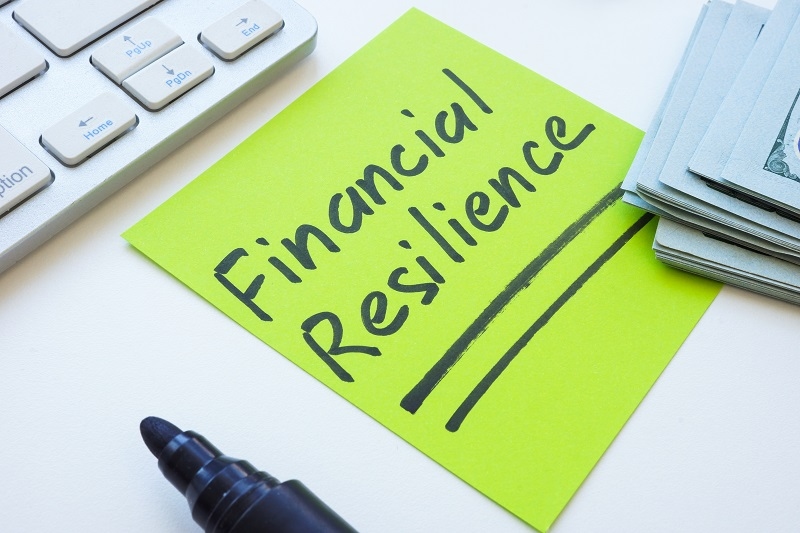Legal Topics

Financial Resilience Explained for Stability & Success
Money is so cumulative in our lives, whether it comes to our everyday decisions, such as buying groceries or making major ones, such as purchasing a house, or even planning how to spend our retirement. Although most individuals are interested in gaining more, financial resilience is more powerful than this. This requires readiness to deal with challenges, secure your future, and build a stable platform for success. In this guide, we shall disaggregate financial resiliency in plain language, highlight handy financial stability hints, and demonstrate how to effortlessly enhance money resiliency to achieve long-term stability.
Building Financial Resilience For A Secure Future
Financial resilience refers to the capacity to spend money prudently in order to cope with unexpected events such as job loss, a doctor's bill, or even an economic recession and overcome them without going into a crisis. It is not only about saving but also about planning, making intelligent decisions, and creating the habits that will safeguard your finances.
Now, we'll talk about the steps to make this idea a part of your life.
What Financial Resilience Really Means
Financial resilience refers to the ability to recover after facing a setback. Picture yourself having a broken car or being confronted with a hospital bill. When you have savings, insurance, and a good plan, you can handle it calmly. In their absence, the stress increases fast.
Richness is not a question, but being ready is. Even a few actions can give you the strength to cope with difficult moments.
Why Financial Resilience Matters In Everyday Life
Life is full of ups and downs. Financial resilience gets you back on track, whether it is inflation, layoffs, or family emergencies. Personal financial resilience means that you are comfortable managing life's curveballs. It enables one to work on benchmarks such as education, owning a house, or retirement, rather than being concerned about each paycheck.
Also read: The Beginners Guide: How To Investigate Financial Fraud
Financial Stability Tips For Everyday Living
Financial stability provides the basis for growth. Simple money habits will help you build a safety net and live without any pressure. These tips can guide you to consistent improvement.
Start With A Realistic Budget
A budget is the first tool for stability. Track your income, bills, and expenses. Divide your money into needs, wants, and savings. Apps or even a notebook can make it simple. The key is being honest with yourself.
Build An Emergency Fund
Sudden expenses are a phenomenon that occurs to all. Experts recommend three to six months of expenses to save for living. However, even when you begin small and save up 50 or 100 dollars every month, it accumulates. This is the hedge against debt in difficult times.
How To Build Financial Security Step By Step
Financial security is concerned with developing a very sound foundation that can underpin you in the long-run. It is an activity that takes into consideration planning in the future, as opposed to short-term budgeting.
Step 1: Invest In Insurance Protection
Insurance is not very exciting, but it is essential. Health insurance, auto insurance, and homeowner or renter insurance can come to your rescue when a significant event hits you, and you will not be broke. Life insurance is another option that should be considered if your family lives on your income.
Step 2: Start Saving For Retirement Early
The sooner you save, the more time your money needs to increase. The modest 401(k) or IRA deposits will grow to a nest egg. Contributions are also matched by many employers, and thus, the free money should be utilised.
Step 3: Focus On Steady Income Growth
Income can be boosted by skill development, promotions, or taking side jobs. An increase in income translates to increased savings, reduced debt repayment, and increased security. Make your career development a financial plan.
Suggested reading: The Guide To Laws For Financial Institutions In The USA

Personal Finance Resilience In A Changing World
Personal finance resilience refers to the ability to remain adaptable and open to transformation in the current dynamic economy. You cannot control everything, but you can be ready for challenges.
Stay Flexible With Your Budget
You can increase your spending, or you can decrease your income. Will you revise your budget regularly to reflect your present reality? This leeway makes you not feel restricted and gives room for smart adjustments.
Build Multiple Income Streams
It is dangerous to depend on just a single paycheck. Think about working half-time as a freelancer, doing jobs via the Internet, or collecting rent. Even little additional income offers security as a back up.
Ways To Improve Money Resilience In Daily Life
The resilience of money is concerned with the creation of a habit which makes your finances stronger day by day. The habit will make you go through bad times and live a happy financial life.
- Practice Smart Spending Choices: Before buying something, ask yourself if it is a need or a want. Look for discounts, use cashback programs, and avoid impulse shopping. Every dollar saved is a step toward resilience.
- Keep Learning About Money: Financial education is power. Listen to podcasts or take free online classes. The more you understand, the better your decisions will be.
Long-Term Financial Planning For Stability And Growth
Significantly, short-term actions are taken with long-term financial planning as the basis of real resilience. This implies having big aspirations and striving towards them gradually.
Set Clear Financial Goals
Choose what is most important to you. Is it purchasing a home, sending children to college, or retiring at a young age? Identify your objectives and make a schedule. Goals provide guidance and motivate you.
Diversify Your Investments
Do not put all your eggs in one basket. Distribute your money between savings, stocks, bonds, and retirement accounts. This makes it less risky and enhances growth. In case one area performs poorly, the other areas can offset it.
Explore more: What Is Legal Tech and How It Transforms Business Ops
Developing A Resilient Mindset Toward Money
Financial success is not merely a matter of numbers but rather of a state of mind. How you think and behave about money defines your resilience. Developing healthy habits and a positive outlook helps you stay strong in facing challenges.
Embrace Patience And Discipline
Resilience cannot be built quickly. Never seek quick solutions or make dangerous investments. Instead, focus on constant saving, intelligent expenditure, and regular planning.
Stay Positive During Challenges
There will be some failures, but they will not give up. Could you look at the solutions and not the problems? All the troubles are a chance to improve your financial routine.
Conclusion
Money in the bank is not the only measure of financial resilience. The ability to think long term, daily habits and thoughtful planning make this stability and success possible. With a few tips about financial stability, how to create economic security, and with some ideas on how to make your money resilient, you are ready not only to sunlight but also to shadow. Incidentally, resilience is developed one step at a time. Starting with any of the three steps of making a budget, paying off debt, or setting retirement targets, each step will make you stronger.
Current Topics
1. How to Choose the Best Personal Injury Lawyer in the USA?
A personal injury lawyer...
2. How to Find the Right Attorney and Choose the Best Lawyer
Finding the right attorn...
3. Healthcare Compliance Rules Every Legal Pro Must Know
Here's the thing. Health...
4. AI ChatGPT Tools in Artificial Intelligence for Lawyers
The world of law is evolving at a pac...
5. What Are the Employment Laws Protecting Worker Rights?
In contemporary jobs, it...
6. Financial Resilience Explained for Stability & Success
Money is so cumulative i...
7. What Are Gig Economy Jobs? Legal Rights You Must Know
The way people work has changed drama...
8. Rights & Mediator's Role in Pregnancy Child Support 2025
The first idea that will come to the ...
9. Digital Courtrooms: VR Evidence & Remote Trials in 2025
Once upon a time, courtrooms were all...
10. How to Find a Good Lawyer Made Simple for Beginners
The first question that ...
